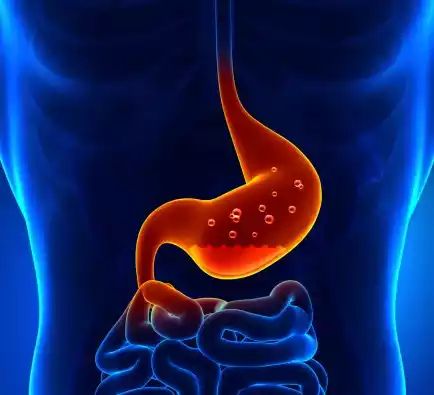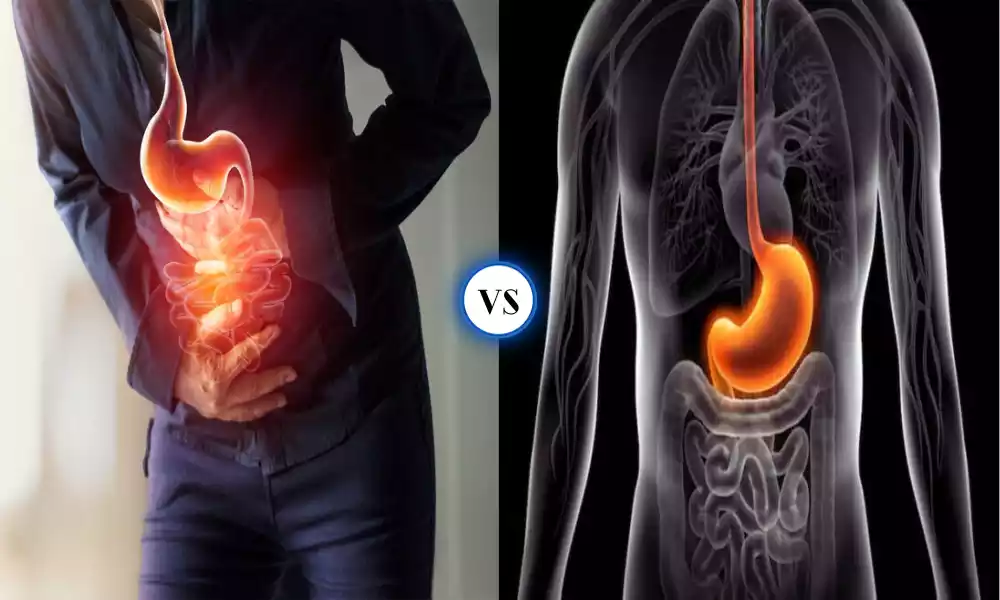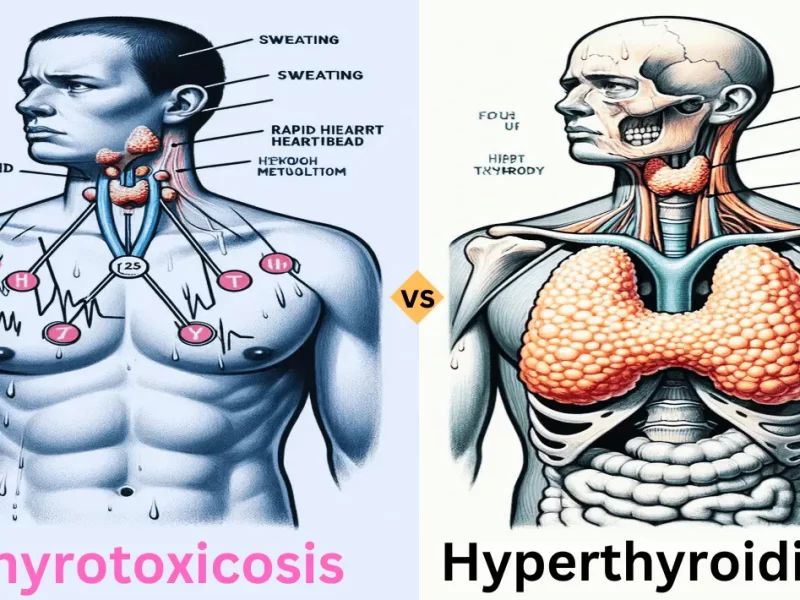Achlorhydria and Hypochlorhydria are both medical conditions that involve an imbalance in the production of stomach acid, known as gastric acid or hydrochloric acid. Achlorhydria refers to a complete absence of stomach acid, while hypochlorhydria signifies a reduced or insufficient production of stomach acid. These conditions play a crucial role in the digestion process and can lead to various gastrointestinal symptoms and complications if left untreated. Understanding the differences between them is essential for accurate diagnosis and effective management.
Definition of Achlorhydria
Achlorhydria is a medical condition characterized by the complete absence or near-total absence of stomach acid, specifically hydrochloric acid (HCl), in the gastric secretions of the stomach. This lack of stomach acid can impair the digestion of food, hinder nutrient absorption, and potentially lead to various gastrointestinal symptoms and nutritional deficiencies.

Achlorhydria is often associated with underlying medical conditions, such as autoimmune disorders or chronic gastritis, and can result from certain medications or surgical procedures. Proper diagnosis and management are essential to address the potential complications associated with achlorhydria.
Causes of Achlorhydria
Achlorhydria, which refers to the complete absence or near-total absence of stomach acid (hydrochloric acid), can have various underlying causes.
Some of the common causes of achlorhydria include:
-
- Autoimmune Conditions: Conditions like autoimmune gastritis can lead to the destruction of the parietal cells in the stomach lining responsible for producing stomach acid. This autoimmune reaction can result in achlorhydria.
- Medications: Long-term use of certain medications, such as proton pump inhibitors (PPIs) and histamine H2-receptor antagonists (H2 blockers), can suppress stomach acid production and potentially lead to achlorhydria.
- Pernicious Anemia: Pernicious anemia is an autoimmune condition in which the body’s immune system attacks the gastric parietal cells and interferes with the production of intrinsic factor, which is necessary for vitamin B12 absorption. This can ultimately lead to achlorhydria.
- Chronic Gastritis: Chronic inflammation of the stomach lining, often caused by infections like H. pylori or other factors, can damage the gastric mucosa and impair acid production, resulting in achlorhydria.
- Gastric Surgery: Some types of gastric surgeries, particularly those that involve the removal or alteration of the stomach, can lead to achlorhydria due to the structural changes in the digestive system.
- Genetic Factors: Rare genetic conditions can also interfere with the development or function of parietal cells, leading to achlorhydria.
- Advanced Age: While not a direct cause, aging is associated with a decrease in stomach acid production. In some cases, this age-related decline can lead to hypochlorhydria or achlorhydria.
- Other Factors: In rare cases, certain infections, tumors, or congenital disorders may contribute to achlorhydria.
It’s essential to identify the underlying cause of achlorhydria to determine the most appropriate treatment and management strategies for individuals with this condition.
Symptoms of Achlorhydria
Achlorhydria, characterized by the complete absence or near-total absence of stomach acid (hydrochloric acid or HCl), can lead to various gastrointestinal symptoms and health issues.
Common symptoms of achlorhydria may include:
- Digestive Problems:
- Persistent indigestion or dyspepsia
- Feeling overly full after eating small meals
- Bloating and abdominal discomfort
- Excessive flatulence (gas)
- Belching
- Nutritional Deficiencies:
- Malabsorption of nutrients, particularly minerals (e.g., calcium, magnesium, iron) and vitamins (e.g., B12, folate)
- Anemia caused by vitamin B12 deficiency is known as pernicious anemia and should be addressed accordingly.
- Fatigue and weakness
- Brittle nails and hair loss
- Easy bruising
- Gastrointestinal Infections:
- Increased susceptibility to gastrointestinal infections due to reduced stomach acid’s protective role against pathogens.
- Food Sensitivities:
- Development of food sensitivities or allergies, as adequate stomach acid is required to break down proteins and prevent allergenic substances from reaching the intestines.
- Unexplained Weight Loss:
- Gradual weight loss due to impaired nutrient absorption and reduced appetite.
- Osteoporosis:
- Due to decreased calcium absorption, the risk of osteoporosis increases.
- Skin Issues:
- Dry skin and potential skin problems due to nutrient deficiencies.
Achlorhydria can result from underlying medical conditions, such as autoimmune disorders or chronic gastritis, and may have long-term health implications if left untreated. If you suspect you have achlorhydria or are experiencing these symptoms, it is crucial to seek medical evaluation and diagnosis to determine the underlying cause and appropriate treatment options.
Definition of Hypochlorhydria
Hypochlorhydria is a medical condition characterized by the insufficient production of stomach acid, particularly hydrochloric acid (HCl), in the gastric secretions of the stomach. In individuals with hypochlorhydria, the levels of stomach acid are lower than what is considered normal for efficient digestion. This condition can lead to various digestive issues, including indigestion, bloating, and impaired nutrient absorption.

Hypochlorhydria may be associated with factors like aging, stress, H. pylori infection, or prior gastric surgery. It is essential to diagnose and manage hypochlorhydria to alleviate symptoms and prevent potential complications.
Causes of Hypochlorhydria
Hypochlorhydria, a condition characterized by reduced or insufficient production of stomach acid (hydrochloric acid or HCl), can result from various factors and underlying causes.
Some common causes of hypochlorhydria include:
-
- Aging: As individuals age, the production of stomach acid tends to decrease naturally, which can lead to a gradual development of hypochlorhydria.
- Stress: Chronic stress and anxiety can affect the normal functioning of the digestive system, potentially reducing stomach acid production.
- H. pylori Infection: Infection with the bacterium Helicobacter pylori can cause chronic gastritis, leading to a decrease in stomach acid production and contributing to hypochlorhydria.
- Medications: Certain medications, such as proton pump inhibitors (PPIs), histamine H2-receptor antagonists (H2 blockers), and antacids, can suppress stomach acid production when used over extended periods.
- Gastric Surgery: Surgical procedures that alter the anatomy of the stomach or remove portions of it may result in reduced acid secretion, leading to hypochlorhydria.
- Autoimmune Gastritis: Autoimmune reactions can damage the parietal cells in the stomach lining, impairing their ability to produce stomach acid and causing hypochlorhydria.
- Chronic Gastritis: Conditions like chronic inflammation of the stomach lining can disrupt normal acid production, potentially leading to hypochlorhydria.
- Other Medical Conditions: Certain medical conditions, such as pernicious anemia and atrophic gastritis, can interfere with stomach acid production and contribute to hypochlorhydria.
- Dietary Factors: Poor dietary habits, including a lack of foods that stimulate acid production (like protein-rich foods), can contribute to reduced stomach acid levels.
- Malnutrition: Chronic hypochlorhydria can impair nutrient absorption, leading to malnutrition over time.
- Genetic Factors: Rare genetic conditions can affect the development or function of parietal cells, leading to reduced acid secretion.
- Environmental Factors: Exposure to environmental toxins or contaminants may, in some cases, contribute to hypochlorhydria.
Identifying the specific cause of hypochlorhydria is crucial for appropriate management and treatment, which may involve dietary adjustments, lifestyle changes, medication, or addressing underlying medical conditions.
Symptoms of Hypochlorhydria
Hypochlorhydria, a condition characterized by reduced or insufficient production of stomach acid (hydrochloric acid or HCl), can lead to a range of digestive symptoms and related health issues.
Common symptoms of hypochlorhydria may include:
- Indigestion:
- Frequent indigestion or discomfort after eating, especially high-protein meals.
- Bloating:
- Persistent bloating and a feeling of fullness, even after consuming small portions of food.
- Acid Reflux:
- Increased susceptibility to acid reflux (heartburn) because of inadequate acid to keep the lower esophageal sphincter tightly closed.
- Burping:
- Frequent burping or belching after meals.
- Gas:
- Excessive flatulence (gas) due to incomplete digestion of carbohydrates and impaired transit of food through the digestive tract.
- Food Sensitivities:
- Development of food sensitivities or allergies, as sufficient stomach acid is necessary to break down proteins and prevent undigested proteins from entering the intestines.
- Nutritional Deficiencies:
- Malabsorption of nutrients, particularly minerals (e.g., calcium, magnesium, iron) and vitamins (e.g., B12, folate).
- Anemia:
- Anemia due to vitamin B12 and iron deficiencies, which can lead to fatigue, weakness, and pale skin.
- Weight Loss:
- Unexplained weight loss due to impaired nutrient absorption and reduced appetite.
- Weak Nails and Hair:
- Brittle nails and hair loss due to nutrient deficiencies.
- Increased Susceptibility to Infections:
- Reduced stomach acid’s protective role against pathogens may lead to an increased risk of gastrointestinal infections.
- Skin Issues:
- Skin problems, such as dryness or rashes, may develop due to nutrient deficiencies.
- Osteoporosis Risk:
- Due to a decrease in calcium absorption, osteoporosis risks have increased substantially.
It’s important to recognize that hypochlorhydria can be caused by various factors, including aging, stress, infections like H. pylori, medications, and underlying medical conditions. Identifying the underlying cause and addressing it is crucial for proper management and treatment. If you suspect you have hypochlorhydria or experience these symptoms, consult with a healthcare professional for an accurate diagnosis and appropriate intervention.
Comparison Table of Achlorhydria and Hypochlorhydria
Here’s a comparison table highlighting the key differences between achlorhydria and hypochlorhydria:
| Characteristic | Achlorhydria | Hypochlorhydria |
|---|---|---|
| Definition | Complete absence or near-total absence of stomach acid (HCl). | Reduced or insufficient production of stomach acid (HCl). |
| Main Feature | Virtually no stomach acid produced. | Reduced but some stomach acid is still produced. |
| Common Causes | Autoimmune conditions, medications (e.g., PPIs), pernicious anemia, chronic gastritis. | Aging, stress, H. pylori infection, medications, gastric surgery. |
| Digestive Symptoms | – Persistent indigestion
– Bloating – Abdominal discomfort – Excessive flatulence – Belching |
– Indigestion
– Bloating – Acid reflux (heartburn) – Burping – Gas |
| Nutritional Deficiencies | Severe deficiencies due to no acid for nutrient breakdown. Commonly vitamin B12, iron, and calcium deficiencies. | Deficiencies are less severe but still possible, often in vitamin B12, iron, and calcium. |
| Anemia Risk | Higher risk due to severe vitamin B12 and iron deficiencies. | Lower risk compared to achlorhydria, but still possible anemia due to vitamin B12 and iron deficiencies. |
| Weight Loss | Gradual weight loss due to malnutrition and reduced appetite. | Unexplained weight loss due to malnutrition and reduced appetite. |
| Food Sensitivities | Common, as undigested proteins may lead to sensitivities and allergies. | Possible, as incomplete digestion can contribute to sensitivities. |
| Skin and Hair Issues | Brittle nails, hair loss, and potential skin problems due to nutrient deficiencies. | Brittle nails, hair loss, and skin issues possible due to nutrient deficiencies. |
| Infection Susceptibility | Increased risk of gastrointestinal infections due to impaired stomach acid’s protective role. | Moderate risk of infections, but less than achlorhydria, as some acid is still present. |
| Osteoporosis Risk | Increased risk due to impaired calcium absorption. | Increased risk due to impaired calcium absorption. |
| Diagnosis | Gastric pH testing, blood tests, endoscopy. | Gastric pH testing, clinical evaluation, endoscopy. |
| Treatment | Hydrochloric acid supplementation, dietary changes, addressing underlying causes. | Dietary modifications, stress management, addressing underlying causes. |
It’s important to note that both achlorhydria and hypochlorhydria can have significant impacts on an individual’s digestive health and overall well-being. Proper diagnosis and management by a healthcare professional are essential for addressing these conditions effectively.
Diagnosis of Achlorhydria and Hypochlorhydria
Diagnosing achlorhydria and hypochlorhydria typically involves a combination of medical history, physical examination, and various diagnostic tests. Here are the common methods used to diagnose these conditions:
Diagnosis of Achlorhydria:
- Medical History and Physical Examination: The healthcare provider will begin by taking a detailed medical history, including any symptoms you’re experiencing, your diet, medication use, and any underlying health conditions that may be contributing to the problem. A physical examination may also be conducted to check for signs of malnutrition or other related issues.
- Gastric pH Testing: This is one of the primary diagnostic tests for achlorhydria. It involves inserting a pH probe through the nose or mouth into the stomach to directly measure the pH level of the gastric contents. A pH level consistently above 4 is indicative of achlorhydria.
- Blood Tests: Blood tests may be conducted to assess nutrient levels, such as vitamin B12, iron, calcium, and magnesium, which can be compromised in individuals with achlorhydria due to impaired absorption.
- Endoscopy: An upper gastrointestinal endoscopy may be performed to visualize the stomach lining and look for signs of gastritis, atrophy, or other structural abnormalities that could be contributing to achlorhydria.
- Stomach Biopsy: During an endoscopy, the healthcare provider may take a small tissue sample (biopsy) from the stomach lining for examination. This can help identify underlying causes, such as autoimmune gastritis.
Diagnosis of Hypochlorhydria:
- Medical History and Physical Examination: Similar to achlorhydria, the diagnostic process begins with a thorough medical history and physical examination to assess symptoms and potential contributing factors.
- Gastric pH Testing: Gastric pH testing is also used for diagnosing hypochlorhydria. In this case, the pH level is measured to confirm reduced stomach acid production, typically a pH level above 4 but below the normal range during fasting.
- Heidelberg Capsule Test: This is a specialized test in which a small electronic capsule is swallowed, and it measures the pH of the stomach continuously over a 24-hour period. It provides detailed data on acid production patterns.
- Serum Gastrin Level: Measurement of serum gastrin levels can help identify conditions like gastrinomas (tumors that produce excessive gastrin) that can lead to hypochlorhydria.
- Endoscopy: An upper gastrointestinal endoscopy may be performed to evaluate the stomach lining for inflammation, atrophy, or other structural issues.
- Trial of Acid Supplementation: In some cases, healthcare providers may perform a therapeutic trial where they prescribe acid supplements and monitor symptom improvement to confirm hypochlorhydria.
The specific tests used may vary depending on the individual’s clinical presentation and the suspected underlying causes. Accurate diagnosis is crucial to determine the appropriate treatment and management strategies for achlorhydria and hypochlorhydria. Consultation with a gastroenterologist or healthcare professional is essential for an accurate diagnosis and tailored treatment plan.
Complications of Achlorhydria and Hypochlorhydria
Achlorhydria and hypochlorhydria are conditions characterized by the absence or reduced production of stomach acid, and they can lead to various complications and health issues if left untreated.
Here are some potential complications associated with both conditions:
Complications of Achlorhydria:
- Malnutrition: Absence of stomach acid impairs the digestion and absorption of essential nutrients, leading to malnutrition. Deficiencies in vitamins (e.g., B12, folate), minerals (e.g., calcium, magnesium, iron), and proteins can occur, resulting in a range of health problems.
- Anemia: Achlorhydria can lead to anemia, particularly pernicious anemia, due to the malabsorption of vitamin B12. Anemia can cause weakness, fatigue and other signs.
- Increased Risk of Infections: Stomach acid plays a protective role by killing harmful bacteria and pathogens in ingested food. Achlorhydria increases the risk of gastrointestinal infections and potentially foodborne illnesses.
- Gastrointestinal Infections: Bacterial overgrowth in the stomach and small intestine can occur due to inadequate acid levels, leading to symptoms like diarrhea, bloating, and abdominal discomfort.
- Food Sensitivities and Allergies: Undigested proteins entering the intestines can lead to the development of food sensitivities and allergies, causing gastrointestinal symptoms.
- Osteoporosis Risk: Reduced calcium absorption due to achlorhydria can contribute to bone health issues, increasing the risk of osteoporosis.
- Neurological Problems: Vitamin B12 deficiency, often seen in achlorhydria, can lead to neurological symptoms such as tingling sensations, numbness, and cognitive disturbances.
Complications of Hypochlorhydria:
- Malnutrition: While less severe than achlorhydria, hypochlorhydria can still lead to nutrient malabsorption and deficiencies, particularly in vitamin B12, iron, and calcium.
- Anemia: Vitamin B12 and iron deficiencies can result in anemia, causing fatigue, weakness, and other anemia-related symptoms.
- Digestive Discomfort: Persistent indigestion, bloating, and discomfort after meals can affect quality of life and nutritional intake.
- Increased Risk of Infections: Hypochlorhydria can elevate the risk of gastrointestinal infections, as stomach acid is less effective in killing pathogens.
- Food Sensitivities: Impaired protein digestion may contribute to the development of food sensitivities, leading to gastrointestinal symptoms.
- Osteoporosis Risk: Reduced calcium absorption may increase the risk of osteoporosis, particularly in individuals with chronic hypochlorhydria.
- Potential GERD (Gastroesophageal Reflux Disease): Chronic acid reflux (heartburn) due to incomplete acid suppression can lead to GERD, which may result in esophageal complications over time.
- Weight Loss: Unexplained weight loss can occur due to malnutrition and reduced appetite.
The severity and specific complications of achlorhydria and hypochlorhydria can vary among individuals, depending on factors like the underlying cause and how long the condition has been present. Seeking prompt medical evaluation and appropriate treatment is crucial to address these complications and improve overall health and well-being.
Treatment for Achlorhydria and Hypochlorhydria
The treatment for achlorhydria and hypochlorhydria aims to address the underlying causes and manage the associated symptoms and complications. Here are the treatment approaches for both conditions:
Treatment for Achlorhydria:
- Hydrochloric Acid (HCl) Supplementation: The primary treatment for achlorhydria involves taking HCl supplements in the form of capsules or tablets. These supplements provide the missing stomach acid, helping to improve digestion and nutrient absorption. They are typically taken with meals.
- Dietary Modifications: Individuals with achlorhydria should consider dietary adjustments to ease digestion. This may include consuming smaller, more frequent meals, avoiding overly fatty or spicy foods, and chewing food thoroughly.
- Treatment of Underlying Causes: If achlorhydria is caused by an underlying condition, such as autoimmune gastritis or chronic gastritis, addressing and managing that condition is essential. Treatment could involve medications to suppress the immune system or other treatments.
- Vitamin and Mineral Supplements: Depending on the extent of nutrient deficiencies, supplementation with vitamins (especially B12) and minerals may be necessary to correct deficiencies.
- Regular Monitoring: Individuals with achlorhydria should undergo regular medical check-ups and monitoring of their nutrient levels to ensure proper management of the condition and prevent complications.
Treatment for Hypochlorhydria:
- Dietary Modifications: Dietary changes can help manage symptoms of hypochlorhydria. These include eating smaller, well-balanced meals, chewing food thoroughly, avoiding overconsumption of liquids during meals, and reducing intake of known irritants like caffeine and alcohol.
- Stress Management: Since stress can contribute to hypochlorhydria, stress reduction techniques such as relaxation exercises, meditation, and yoga may be beneficial.
- H. pylori Eradication: If a Helicobacter pylori infection is the underlying cause of hypochlorhydria, appropriate antibiotic treatment is necessary to eliminate the infection.
- Medication Adjustment: If hypochlorhydria is medication-induced (e.g., due to the long-term use of proton pump inhibitors or H2 blockers), a healthcare provider may consider adjusting or discontinuing these medications when possible.
- Vitamin and Mineral Supplements: Depending on nutrient deficiencies, supplements such as vitamin B12, iron, and calcium may be recommended.
- Treatment of Underlying Conditions: If hypochlorhydria is secondary to an underlying medical condition, addressing and managing that condition is essential to improve stomach acid production.
- Regular Monitoring: Regular follow-up appointments and monitoring of nutrient levels are important to track progress and ensure that deficiencies are adequately addressed.
It’s crucial for individuals with achlorhydria or hypochlorhydria to work closely with a healthcare provider to determine the underlying cause and develop a personalized treatment plan. Self-diagnosis and self-treatment can be risky, as these conditions can have varying causes and severity levels.
Prevention of Achlorhydria and Hypochlorhydria
Preventing achlorhydria and hypochlorhydria primarily involves minimizing risk factors and addressing underlying causes when possible. While some factors, like aging, cannot be entirely prevented, there are steps individuals can take to reduce their risk and promote stomach health:
Prevention of Achlorhydria:
- Manage Autoimmune Conditions: If you have an autoimmune condition that increases the risk of achlorhydria, work closely with your healthcare provider to manage the condition effectively. This may involve immunosuppressive medications and regular monitoring.
- Use Medications with Caution: If you are prescribed medications like proton pump inhibitors (PPIs) or H2 blockers for gastric conditions, take them as directed and discuss their long-term use with your healthcare provider. Avoid unnecessary or prolonged use.
- Maintain a Healthy Diet: Consume a balanced diet rich in nutrients and fiber. Include foods that stimulate stomach acid production, such as proteins. Avoid excessive consumption of alcohol and spicy, acidic, or fatty foods.
- Stay Hydrated: Drinking an adequate amount of water supports overall digestive health.
- Regular Check-ups: Schedule regular medical check-ups to monitor your stomach health and nutrient levels, especially if you have risk factors or digestive symptoms.
Prevention of Hypochlorhydria:
- Stress Management: Practice stress-reduction techniques like mindfulness, meditation, yoga, or deep breathing exercises to help maintain a healthy digestive system.
- Healthy Eating Habits: Eat balanced meals, chew food thoroughly, and avoid overconsumption of liquids during meals. Limit caffeine and alcohol intake.
- H. pylori Prevention: Follow good hygiene practices to reduce the risk of Helicobacter pylori (H. pylori) infection. This includes thorough handwashing and avoiding contaminated food or water sources.
- Medication Management: If you need to take medications that can reduce stomach acid, such as antacids or acid-suppressing drugs, discuss the duration and necessity of their use with your healthcare provider. Follow their recommendations closely.
- Address Underlying Conditions: If you have medical conditions contributing to hypochlorhydria, such as gastritis or gastrinomas, work with your healthcare provider to manage and treat these conditions effectively.
- Regular Health Check-ups: Visit your healthcare provider for routine check-ups, especially if you experience digestive symptoms or have risk factors for hypochlorhydria.
While these preventive measures can help reduce the risk of achlorhydria and hypochlorhydria, some factors like aging and genetic predisposition may still play a role in the development of these conditions. If you suspect or are at risk for these conditions, consult with a healthcare professional for personalized guidance and early intervention if needed.
Similarities of Achlorhydria and Hypochlorhydria
Achlorhydria and hypochlorhydria are both conditions related to low stomach acid production. While they are not the same, they share some similarities, including:
-
- Stomach Acid Deficiency: Both conditions involve insufficient production of hydrochloric acid (HCl) in the stomach, which plays a crucial role in the digestive process.
- Digestive Issues: Achlorhydria and hypochlorhydria can both lead to digestive problems, such as indigestion, bloating, and discomfort after meals. Insufficient stomach acid can interfere with the breakdown of food and nutrient absorption.
- Nutritional Deficiencies: Both conditions can result in malabsorption of essential nutrients, including vitamins (such as B12) and minerals (such as iron and calcium). This can lead to nutritional deficiencies and related health issues.
- Increased Risk of Infections: Low stomach acid can reduce the stomach’s natural defense mechanism against harmful bacteria and pathogens that enter the digestive tract with food. This can increase the risk of gastrointestinal infections.
- Symptom Overlap: The symptoms of achlorhydria and hypochlorhydria can overlap, making it challenging to distinguish between the two based solely on symptoms. Common symptoms include heartburn, acid reflux, nausea, and abdominal discomfort.
- Potential Causes: Both conditions can have various underlying causes, including autoimmune disorders, certain medications, chronic gastritis, Helicobacter pylori infection, aging (as stomach acid production tends to decrease with age), and other medical conditions.
- Diagnostic Challenges: Diagnosing both achlorhydria and hypochlorhydria typically involves specialized tests, such as gastric pH testing or blood tests for specific markers like gastrin levels. These tests can help determine the extent of stomach acid deficiency.
- Treatment Approach: The treatment approaches for achlorhydria and hypochlorhydria share similarities, as they both aim to address the underlying causes and manage symptoms. Treatment may include dietary modifications, medications, supplements, and lifestyle changes to improve digestion and alleviate related issues.
Despite these similarities, it’s important to recognize that achlorhydria represents a more severe form of low stomach acid, where acid production is almost entirely absent, while hypochlorhydria indicates a partial reduction in stomach acid production. The specific treatment and management may vary depending on the severity of the condition and its underlying causes, which should be assessed by a healthcare professional.
Conclusion
Achlorhydria and Hypochlorhydria are distinct gastrointestinal conditions characterized by either the complete absence or reduced production of stomach acid, respectively. These conditions can lead to a range of complications, including malnutrition, anemia, increased susceptibility to infections, and digestive discomfort. Accurate diagnosis and appropriate treatment are essential to address the underlying causes and manage symptoms effectively.
Individuals with these conditions should work closely with healthcare professionals to prevent long-term health issues and improve their overall quality of life through tailored interventions and nutritional support.



